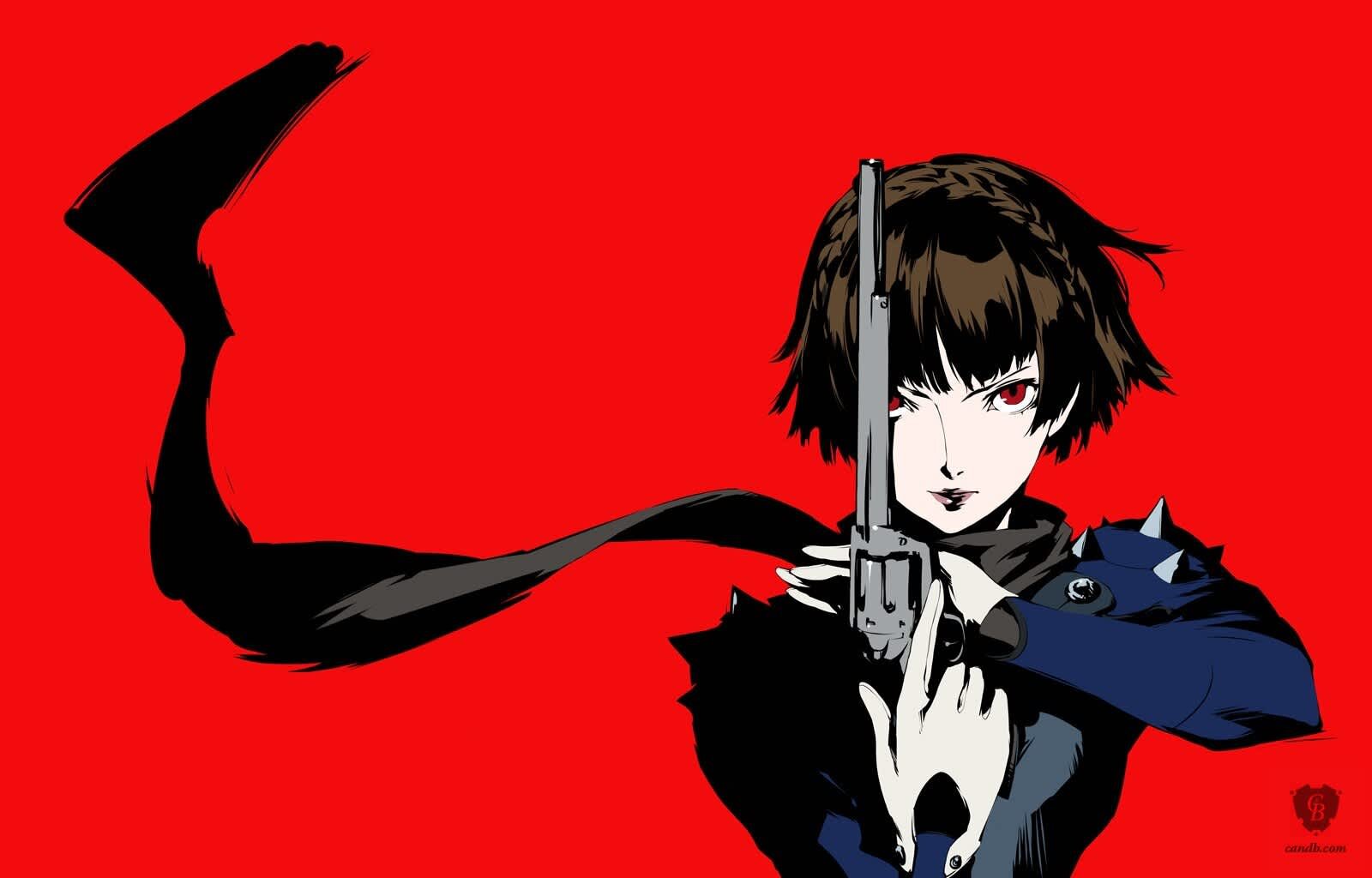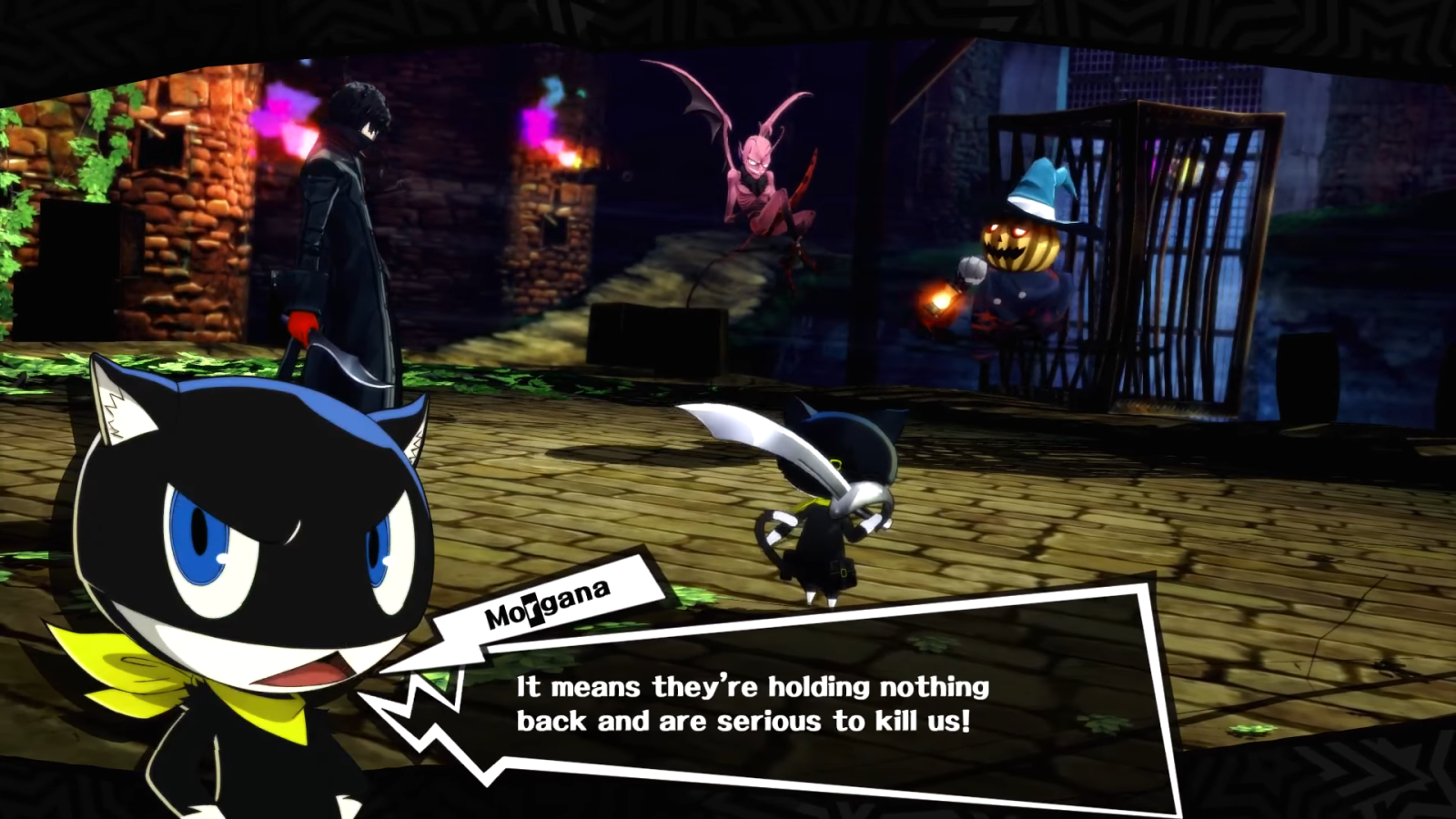Persona 5: Impressions of a n00b
As a lifelong gamer and JRPG-er, it’s weird that I somehow dodged the magnetic field rippling out of the Persona series until 2018. There were a few close brushes along the way: I have a vague recollection of renting Persona 1 as a kid, maybe even for entertainment at my own birthday party (a really, REALLY weird choice in retrospect), and my email history is proof that at some point I owned Persona 3, but I guess I sold it, because I don’t own it anymore, and I have no memory of actually playing it. I read the reviews of each game and tried to convince myself to give them a shot, but I think what ultimately scared me off was the supposedly massive time commitment each one required, as best evidenced by my younger brother, who himself played Persona 3 for an interminable five-year stretch between 2008 and 2013.
Today, however, I am the proud vanquisher of Persona 5, and I am delighted to report that the whole experience only took a few months. I’m not sure what my brother was doing for five years, and frankly, I’d rather not hazard any guesses. In an effort to steer clear of whatever black hole he was sucked into, I did plug away pretty regularly, but even if I hadn’t, I can’t imagine it would have been too grueling of an undertaking. I mean, shit - I hung out with Geralt for way longer than this. Anyway, since I’m essentially a newcomer to the series, here’s a Good/Bad/Ugly recap of my time with the game from a rookie perspective.
THE GOOD
There’s a lot of good in this game. First - and this isn’t news to anyone, so I won’t spill too much ink on it - the art direction/style/graphics/whatever is nuts. It’s hard to revisit anything with even a whiff of jankiness after experiencing the sensory gut-punch that is Persona 5. I don’t make video games, so I can’t speak to what Atlus is doing to be so many heads above other developers, but Jesus, it must have been a crushing amount of work. Was a single person assigned to each page of each menu? How many employees had to work in congress to make that wacky font jiggle and vibrate just so? A million? Everything - everything - is so very fluid, from the all-in group attacks punctuated by a cheesy postcard and tagline to the dizzying camerawork that accompanies ambushing an enemy, that it boggles the mind. My mind is boggled. Incredible character design with seasonal outfit changes and a healthy dose of abject weirdness? Check. Ann sports red latex and a tail, and Futaba looks like an extra in Tron. Wacky enemies? Well, there’s a giant penis riding a chariot, so check, I guess. The whole package is so awesome that it’s almost overwhelming, but in a good way.
The story is also generally great, although I’m told it doesn’t quite measure up to some of the darker plots of previous games. I wouldn’t know, although I’ll go on record as saying that teachers sexually assaulting their students plus psychic attacks causing widespread blood-from-eyeballs is plenty dark for me. “Teens versus adults” seems to be the theme here, and while it’s not at all fair to categorize all teens as, for lack of a better word, “woke”, and all adults as corrupted or jaded or otherwise compromised, the game makes plenty of useful points about standing up for yourself and, you know, SEEING THROUGH THE BULLSHIT, man. At 32, I don’t know how deeply this “fuck the establishment” battlecry resonates in my ancient heart, but by god, I was rooting for those crazy kids. Adults are the worst! There’s also a low-key storyline running throughout about public opinion and attention span in the age of the 24-hour news cycle that’s almost poignant, especially towards the end, but it ultimately veers off into the mystical a little too hard to make any salient points. Still, it’s cool that a video game attempted to address these things at all.
MUSIC. The music is so excellent. The soundtrack is some kind of freaky mix of elevator music, jazz/funk, and adult contemporary, and that sounds so bad on paper, and honestly, if I heard one of the songs in isolation and then never again, I’d almost definitely hate it, but after only a few in-game repetitions (and there are way more than a few), almost every song became my new favorite song ever. If I wasn’t humming along, I was outright belting the lyrics - “WHERE HAVE YOU BEEN? BEEN SEARCHING ALL ALONG!” - and the assorted remixes that might accompany, say, a rainy day in Shibuya, are just extra frosting.
Same goes for the voice acting, with only a few exceptions that I’ll speak to a little later. Sure, a good bit of it was over-the-top - Ryuji could stand to pop a few tranquilizers - but I get that it’s a heavily stylized game, and the exaggerated vocal mannerisms suit the vibe. The actresses voicing Morgana and Makoto deserve special recognition for the sheer humanity and genuine likeability they imparted to their characters, and I’m not saying that just because Morgana is my best l’il buddy or because I taught Makoto the ways of, um, “love” up in my attic bedroom that one time. Bad guys are convincingly bad without resorting to histrionics for the most part, maybe because they’re (mostly) deluded humans taking advantage of others and not nutty warlocks bent on world domination. It’s refreshing, really.
The battle system, what with all its magic hurling, gunslinging, buffing and de-buffing, and arguing with ancient personas that inexplicably all refer to me as “sonny,” is a delight. What no doubt looks impenetrable to the casual onlooker is, while inarguably complex, actually quite intuitive, and there are endless avenues for customization to suit the needs of the situation. After getting stomped by various bosses, I never had any trouble diagnosing the problem and then working up a solution with my dude Igor in his moody emo-chamber of nightmares. Most importantly, the battles are fun, if for no other reason than that they can spin off in so many different directions or, if necessary, be concluded in fifteen seconds or so (“I’ve already met you, snow tiger, so give me money and begone”).
The flipside of palace battling is, of course, hanging out in the real world with your buddies and going to school, which didn’t seem like it could possibly hold any real appeal until I actually tried it on for size. Turns out, there’s something comforting, even Zen-like, about the peaceful routine of going to school and then picking an after-school and evening activity with or without a companion. The variety of locations to visit, potential date spots, and unique dialogue to accompany everything floored me, and I’m quite sure I could start the game over and have a totally different experience from the one I just finished. For me, though, I had no trouble identifying the confidants with whom I actually wanted to spend time and those I was happy to ignore (nice to meet you, Ohya, but also...no), so I wasn’t left wishing I’d spent more time with anyone in particular. Like in real life, my group of close friends came together naturally, and I loved hanging out with them.
THE BAD
So, lurking amongst all this good, what’s bad?
Really, the bad is almost all limited to antiquated JRPG tropes that really should have shuffled off to the sidelines by now, and they’re all the more noticeable amidst the crazy-high production value of this otherwise enlightened-seeming game.
Listen, I know the silent protagonist thing is highly valued in some circles, but in so many circumstances - and this one is no different - it just doesn’t even halfway make sense. Why should I of all people serve as the nucleus of this group of freedom fighters? I don’t make a goddamn peep unless I’m spoken to directly, and only then to answer whatever question was asked of me in five words or less! And I’ve never been referred to as “this guy” by my friends when I’m standing right next to them in real life, but it happens all the time in Persona V. Who has two thumbs and wishes he was an established characterwith a fully voiced personality? THIS GUY.
Next, the translation is a strange beast. Calling it “bad” probably isn’t exactly right, but it’s...off in some very peculiar ways. Once I started noticing it - and it actually took me fifteen hours or so - I couldn’t un-notice it: a whole lot of the dialogue doesn’t quite make sense. Like, the general idea is there, but words are put in odd places or used in ways that are close to the intended meaning but still miss the mark. I’ve heard that Persona 4 is the high-water mark of unassailable translation, and I have to assume Persona 5 represents a marginal step backwards. In spite of the weirdness, though, the voice cast sells the shit out of their lines, which is probably why it took me so long to pick up on the weirdness in the first place.
Finally, while, as I noted above, most of the voice acting is great, they just hadto include Haru. God, I really don’t need any more dog-whistle-pitched, might-be-eight-years-old characters voiced by adult women speaking as high as they can in my RPGs. What is it with this trope? Almost everyone else is great, even if some of the adult male characters tend to sound alike (and I’m pretty sure they’re actually voiced by different actors), but not Haru. Haru is not great. Fortunately, given the nature of the game, I had the option to give Haru the full-blown cold shoulder, and I exercised that option hard. She has a nice axe, at least.
THE UGLY
There’s the dick monster, to start. He was ugly.
And that’s actually a good (?) segue into something legitimately ugly: objectification of women and wonky gender politics is a major and glaring tonal fuck-up in Persona 5. A few examples off the top of my head: the male characters falling all over each other to look up Ann’s skirt while she’s asleep; Ryuji losing his mind and aggressively miming boob-squeezing at the sight of Ann in a bikini; virginal, pure Makoto asking me, a younger guy at her school, to show her how to do sex (although maybe this is more icky wish-fulfillment than outright problematic); the (correct!) treatment of adult male attention directed at teenage girls as predatorial and illegal (Kamoshida → Ann) versus the treatment of adult female attention directed at teenage boys as not only legal but desirable (Ohya, Takemi, Kawakami → Protagonist). And that’s not to mention Ann’s puzzling drive to become Japan’s top model in order to somehow achieve self-actualization, prove her worth to Shiho, and promote societal welfare. Maybe there’s a cultural difference at play there, but regardless, it sure is a confounding plot point from my American perspective. Really, it’s bizarre and discomfiting how much time the whole range of characters spends discussing Ann’s body. The game is all over the place in trying to marry various obsolete viewpoints with a more heightened awareness, and needless to say, it is less than unsuccessful in doing so. You’ve got a ways to go, Atlus.
That aside, though, Persona 5 was a hell of a good time, even if I don’t see myself giving New Game+ a go any time soon - one hundred hours seems like enough to sink into it for now. It’s a testament to the designers that I can crank out a write-up this lengthy and still feel like I’ve barely brushed the surface of all the game has to offer (I didn’t talk about fishing! Or the batting cages! Or how lost I got in the subway!), but here we are. I don’t know that I need to go back to Persona 1, but I’ve got my sights set on 4, and you know I’m board for 6 whenever it should arrive.









